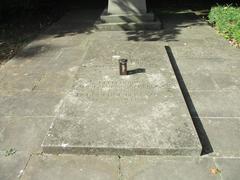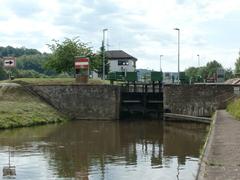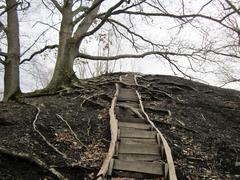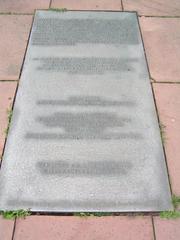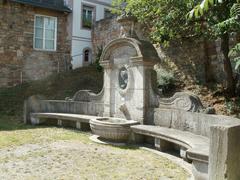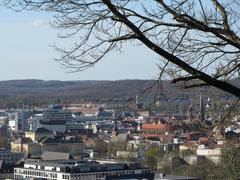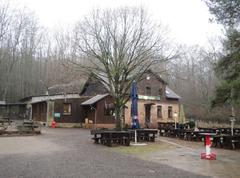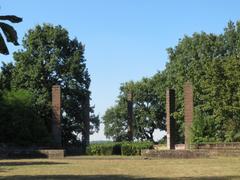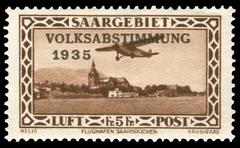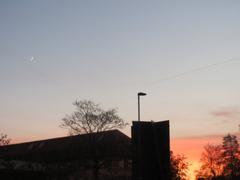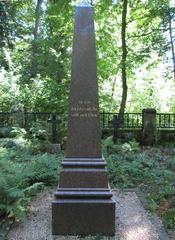Dreibannstein Saarbrücken: Visiting Hours, Tickets, and Historical Sites Guide
Date: 03/07/2025
Introduction
Nestled in the scenic Saarland region near the vibrant city of Saarbrücken, the Dreibannstein stands as a remarkable historical monument encapsulating centuries of territorial evolution and cultural fusion. As the “Three Banner Stone” or “Three Borders Stone,” it historically marked the meeting point of three important territories—Saarbrücken, St. Johann, and Malstatt-Burbach—which merged to form modern Saarbrücken in 1909. Originating in the mid-18th century, the Dreibannstein symbolizes fluctuating borders, feudal disputes, and the region’s unique blend of German and French heritage. Today, it serves not only as a tangible reminder of Saarland’s political past but also as a symbol of its cross-border cultural identity.
Located in the Warndt forest and the SaarMoselle region, the Dreibannstein invites visitors to explore both history and nature. Integrated into a network of hiking and cycling trails, it offers interpretive signage, guided tours, and regular cultural events. The site is accessible year-round without fees or restrictions, making it ideal for both spontaneous visits and planned excursions. Nearby, Saarbrücken Castle, the Old Bridge, and other historical landmarks enrich the visitor experience.
For up-to-date information on visiting, hiking routes, and planning your trip, consult the Saarbrücken Tourism and Regionalverband Saarbrücken resources.
Table of Contents
- Discover the Dreibannstein: Saarbrücken’s Historic Boundary Stone
- Visiting the Dreibannstein in Saarbrücken: History, Access, and Travel Tips
- Dreibannstein Visiting Hours, Tickets, and Hiking Guide
- Introduction
- Location and Access
- Visiting Hours and Tickets
- Trail Information and Terrain
- Site Features and Historical Significance
- Guided Tours and Special Events
- Safety and Seasonal Considerations
- Accessibility
- Visitor Amenities and Nearby Attractions
- Practical Tips for Visitors
- Maps and Further Resources
- Visitor Conduct and Regulations
- Frequently Asked Questions (FAQ)
- Visuals and Media
- Related Articles
- Conclusion
- Plan Your Perfect Visit: Dreibannstein and Saarbrücken Historical Sites
- Introduction
- Historical and Geographical Context of Dreibannstein
- Practical Visitor Information
- Integrating Dreibannstein into a Saarbrücken Historical Sites Itinerary
- Visitor Tips for a Memorable Experience
- Sample Day Plan Featuring Dreibannstein
- Additional Attractions Near Dreibannstein
- Integrating for Different Traveler Types
- Logistics and Transport
- Visuals and Media
- Call to Action
- Summary and Recommendations
- References and External Links
Discover the Dreibannstein: Saarbrücken’s Historic Boundary Stone
A Brief History
The Dreibannstein near Saarbrücken embodies the region’s complex territorial past, shaped by centuries of shifting borders and administrative reforms. Originating as a medieval boundary marker, it demarcated the convergence of the domains of Saarbrücken, St. Johann, and Malstatt-Burbach—three towns unified in 1909. The Saarland region has a long history as a crossroads of Celtic, Roman, and medieval influences. Despite wars and treaties, the Dreibannstein remained a fixed landmark, symbolizing local identity amid political upheaval.
Why Visit?
The Dreibannstein is a protected cultural monument and an educational site, ideal for history enthusiasts, school groups, and travelers exploring Saarbrücken’s historical landscape.
Visiting Hours and Tickets
- Opening Hours: Open year-round, accessible any time (outdoor monument).
- Admission: Free.
- Guided Tours: Offered by local tourism offices; advance booking recommended.
How to Get There
- Location: Near well-marked hiking trails outside central Saarbrücken.
- By Car: Parking is available at nearby trailheads.
- Public Transport: Local buses reach the area; check the Saarbrücken transport website for routes.
Accessibility
The Dreibannstein is accessed via hiking paths; some may be uneven. Visitors with mobility needs should consult local tourism offices for the latest accessibility details.
Nearby Attractions
- Saarbrücken Castle
- Old Bridge (Alte Brücke)
- Sankt Johanner Markt
Visual and Interactive Resources
Find maps, images, and virtual tours on the official Saarbrücken tourism website.
Frequently Asked Questions (FAQ)
- Q: What are the visiting hours?
A: Open year-round, any time, free of charge. - Q: Is there an entrance fee?
A: No. - Q: Are guided tours available?
A: Yes, book through Saarbrücken tourism offices. - Q: How do I get there from the city center?
A: By car, bike, or public transport, followed by a short hike. - Q: Is the site accessible for people with disabilities?
A: Some terrain may be challenging; check with tourism services.
Visiting the Dreibannstein in Saarbrücken: History, Access, and Travel Tips
Historical and Cultural Context
The Dreibannstein marks the historic meeting point of three administrative districts (Banne) and stands out for its location in the SaarMoselle region, a crossroads of German and French culture (Regionalverband Saarbrücken). Its existence reflects centuries of fluctuating borders and regional cooperation, now symbolized by the Eurodistrict SaarMoselle initiative.
Local educational projects bring the Dreibannstein’s history alive through multilingual brochures and digital media, and cultural events explore identity and unity.
Geographical Setting
Located in the Warndt forest, near the Saar River, the Dreibannstein is surrounded by biodiversity and scenic landscapes (Saarbrücken.de). It is part of a network of hiking and cycling trails connecting historical and natural attractions (Mapcarta).
Visitor Experience
- Hours & Fees: Accessible 24/7, free of charge.
- Trails: Well-maintained and signposted; some accessible sections.
- Guided Tours: Seasonal walks and events are offered (Regionalverband Saarbrücken).
- Amenities: Restaurants and facilities in nearby towns.
- Responsible Tourism: Stay on trails, carry out litter, and respect the environment (Happy to Wander).
Visuals and Resources
High-quality images and interactive maps are available on the Regionalverband Saarbrücken website.
FAQ
- Q: How do I get to the Dreibannstein?
A: By car or public transport to Saarbrücken, then hike or cycle. - Q: Are there entrance fees?
A: No. - Q: Is it wheelchair accessible?
A: Some nearby trails are; the immediate area may not be. - Q: Are guided tours available?
A: Yes, seasonally. - Q: What amenities are nearby?
A: Towns offer restaurants, accommodations, and attractions.
Dreibannstein Visiting Hours, Tickets, and Hiking Guide
Location and Access
Located near Hülzweiler (Schwalbach municipality), along the “Traumschleife Waldzeit” hiking trail (touren.saarland).
- By Car: Exit A8 (Schwalbach), follow L341 to Hülzweiler, parking at Freilichtbühne Hülzweiler.
- By Public Transport: From Saarlouis station, take bus 402/404 to Hülzweiler; trailhead is an 8-minute walk (saarfahrplan.de).
Trail Information
- Length: 10–12 km (full loop); shorter options available.
- Elevation: Moderate (approx. 141 m).
- Markings: Well signposted with informational boards.
Site Features
- Established: 1757, marking Lorraine, Imperial territory, and Nassau-Saarbrücken.
- Description: Stone pillar with historic engravings; interpretive signage onsite.
- Photo Opportunities: Woodland clearing, especially scenic in spring and autumn.
Guided Tours and Events
Occasional guided tours are organized by local hiking clubs. Seasonal events at nearby Freilichtbühne Hülzweiler further enhance the visit.
Safety and Seasonal Tips
- Conditions: Trails can be muddy/slippery after rain; sturdy boots recommended.
- Weather: Typical Central European climate; summer 25–30°C, cold winters.
- Hazards: Watch for falling branches and icy patches.
Accessibility
- Mobility: Trails are unpaved and uneven; not suitable for wheelchairs or strollers.
- Rest Areas: Benches and picnic spots near Freilichtbühne and Kneippanlage.
- Facilities: Toilets at Freilichtbühne; none at the monument.
Visitor Amenities and Attractions
- Freilichtbühne Hülzweiler: Open-air stage, picnic areas, summer events.
- Kneippanlage: Water-treading facility.
- Waldsee Schwalbach: Forest lake.
- Schönstatt-Kapelle: Chapel for reflection.
Practical Tips
- Best Time: May–October.
- Bring: Water, snacks, map/GPS, layered clothing, rain gear.
- Dogs: Leashed dogs welcome.
- Leave No Trace: Carry out litter.
Maps and Resources
Visitor Conduct
- Stay on trails.
- Hiking at your own risk.
- Check for temporary trail closures.
FAQ
- Q: Are there entrance fees?
A: No. - Q: Visiting hours?
A: Open any time, year-round. - Q: Wheelchair accessibility?
A: Not suitable. - Q: Guided tours?
A: Occasionally, via local clubs. - Q: Can I bring my dog?
A: Yes, leashed.
Plan Your Perfect Visit: Dreibannstein and Saarbrücken Historical Sites
Historical Context
The Dreibannstein at Deichelsbrücke, erected in 1757, marks the convergence of the Hülzweiler Bann (Lorraine), Schwarzenholzer Bann (imperial territory), and Schwalbacher Bann (Nassau-Saarbrücken), with each face bearing unique emblems (Komoot).
Practical Information
- Hours/Tickets: Open-air, free, no tickets.
- Location: Near Deichelsbrücke, accessible by car or public transport plus a hike.
- Accessibility: Moderate; terrain may be challenging for wheelchairs.
- Recommended Hikes: 4.5 km (1h10), 6.9 km (1h50), or 11.8 km (3h).
Itinerary Ideas
- Morning: Saarbrücken Castle and Old Town (Travel Buddies Lifestyle)
- Midday: Deutsch-Französischer Garten (Tourismus Saarbrücken)
- Afternoon: Hike to Dreibannstein (Komoot)
- Evening: Dinner in Saarbrücken
Additional Attractions
- Aussichtsturm am Krickelsberg
- Keltisches Wagengrab Püttlingen
- Waldzeitallee and Flowtrail
Traveler Types
- Families: Combine with parks/playgrounds.
- History Enthusiasts: Add Saar Historical Museum, Alte Brücke.
- Outdoor Adventurers: Use as a waypoint for longer hikes.
Transport and Logistics
- Public Transport: City network connects to trailheads.
- Parking: Available near trails.
- Accessibility: Generally good for moderate mobility; check ahead.
Visuals and Media
Use high-quality images with descriptive alt text, and consider interactive trail maps.
Call to Action
Plan your visit, download the Audiala app for guides, and follow #VisitDreibannstein for travel inspiration.
Summary and Recommendations
The Dreibannstein near Saarbrücken is a compelling emblem of the region’s historical and cultural heritage. Easily accessible, free to visit, and surrounded by scenic forest, it offers a unique blend of history, nature, and recreation. Nearby attractions such as Saarbrücken Castle, the Old Bridge, and the Deutsch-Französischer Garten further enrich the experience.
For current details on visits, accessibility, tours, and related sites, consult the Saarbrücken Tourism website and Regionalverband Saarbrücken. Enhance your experience with the Audiala app and join the community using #VisitDreibannstein.
References and External Links
- Visiting the Dreibannstein: History, Hours, and Tips for Saarbrücken’s Historic Boundary Stone, 2025, Saarbrücken Tourism (Saarbrücken Tourism)
- Visiting the Dreibannstein in Saarbrücken: History, Access, and Travel Tips, 2025, Regionalverband Saarbrücken (Regionalverband Saarbrücken)
- Dreibannstein Visiting Hours, Tickets, and Hiking Guide to Saarbrücken’s Historic Boundary Marker, 2025, touren.saarland (touren.saarland)
- Dreibannstein Visiting Hours, Tickets, and Saarbrücken Historical Sites Guide: Plan Your Perfect Visit, 2025, Komoot (Komoot)
